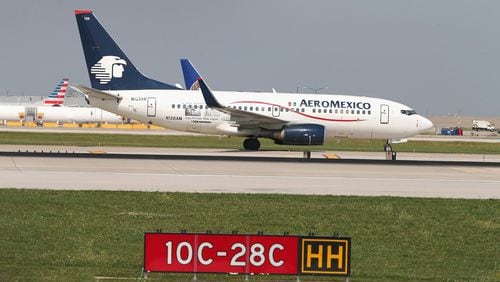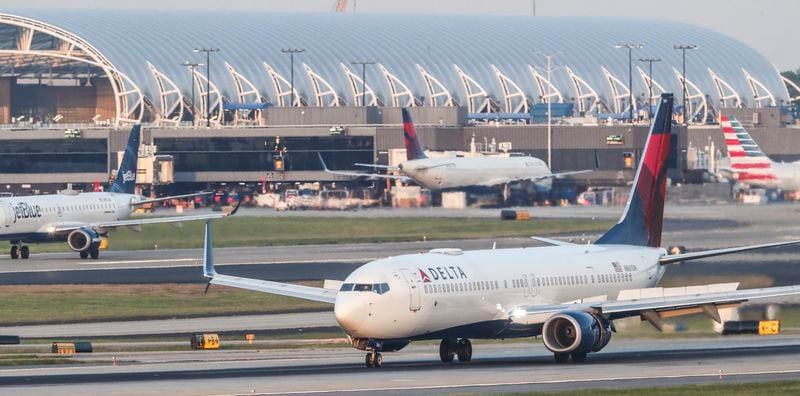Georgia lawmakers and business leaders are going to bat for Atlanta-based Delta Air Lines, which is facing the cancellation of a key partnership over a dispute between the U.S. government and Mexico about aviation access.
Gov. Brian Kemp and members of Georgia’s congressional delegation have urged the U.S. Department of Transportation not to end Delta’s joint venture with Aeromexico, citing potential damage to the state’s economy.
The partnership, which enjoys antitrust immunity, allows the carriers to cooperate on cross-border flights, including some through Hartsfield-Jackson International Airport. DOT in January made a tentative decision to dismiss the carriers’ application to renew antitrust immunity.
“I object to this decision, as it would increase costs for consumers, adversely affect Georgia’s economy, and place thousands of jobs at risk,” Kemp wrote in a Feb. 23 letter to Transportation Secretary Pete Buttigieg. Kemp called the Delta-Aeromexico partnership “a critical component of our international trading infrastructure.”
Delta says if the antitrust immunity is rescinded, as many as 21 flights between the U.S. and Mexico would be put at risk. These include including flights from Atlanta launched by Aeromexico this year to Guadalajara, Guanajuato, Merida and Monterrey, as well as a route to Queretaro planned to launch this fall.
Delta is also threatening to take legal action if the DOT finalizes its decision. Peter Carter, Delta’s executive vice president of external affairs, in an interview with The Atlanta Journal-Constitution, called DOT’s tentative order “arbitrary and capricious.”
The DOT declined to comment.
A joint venture with antitrust immunity allows two partner airlines to cooperate to offer more to travelers by filling flights with customers from both airlines and both countries. It’s generally permitted in international markets only when there are so-called “Open Skies” agreements that liberalize restrictions on service between the countries to deregulate airline competition.
Credit: JOHN SPINK / AJC
Credit: JOHN SPINK / AJC
The DOT said a fully liberalized aviation agreement is a “necessary precondition” for the continuation of a joint venture with antitrust immunity. It said “recent actions taken by the Government of Mexico have in effect removed the necessary precondition.”
The Associated Press reported last year Mexico’s armed forces were taking control of Mexico City Benito Juarez International Airport (MEX), after building an airport run by the military outside Mexico City, among other moves, and Mexican President Andres Manuel Lopez Obrador launched a state-run airline led by the military.
The DOT in its tentative order said flight capacity at Mexico City International has been reduced “to the detriment of both current air carriers and potential new entrants,” and voiced concerns about a lack of transparency in how flying rights are allocated.
Letters from Metro Atlanta Chamber President and CEO Katie Kirkpatrick and one signed by 12 of Georgia’s 14 U.S. House members echoed Kemp’s economic concerns.
Kirkpatrick also told Buttigieg that “the entire world will be watching or visiting our city when eight matches of the FIFA World Cup are played in Atlanta during the summer of 2026″ and that the World Cup overall would have teams participating in 16 cities in North America, including three in Mexico.
“Competing players, team staff, and millions of fans will rely on our air travel networks to reach matches across all host cities throughout the 30-day tournament period,” she wrote.
The League of United Latin American Citizens has also weighed in, saying ending the Delta-Aeromexico joint venture “could mean higher fares and fewer choices for American-Latino families.”
Not everyone is taking Delta’s side.
Rival American Airlines, the leading U.S. carrier in the Latin American market, submitted comments in the federal docket saying Delta and Aeromexico “have benefitted from (antitrust immunity) for more than seven years despite the Department’s consistent concerns regarding the Mexican government’s management” of Mexico City’s airport.
A decision on the matter could come in coming weeks or months.
The volume of high-profile supporters Delta has marshaled in its campaign against the DOT decision signifies the company sees this as a seminal matter that could influence its future.
Carter, the Delta executive, acknowledged U.S.-Mexico flights are “a small piece” of the airline’s total business.
“But it’s an enormously important part of who we want to be. We want to be the airline that truly does connect the world,” he said. “And so to have a decision from our own regulator, that is kind of an pulling apart part of that network ... and undoing this JV, it’s really unfortunate.”








